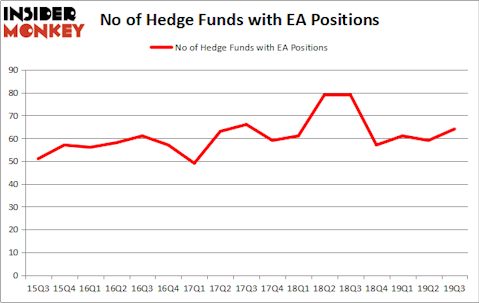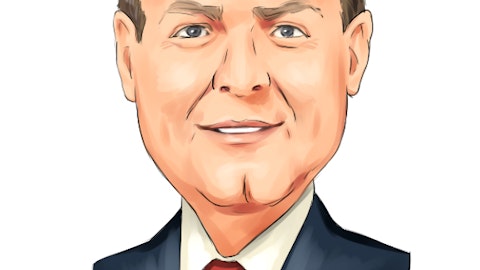We are still in an overall bull market and many stocks that smart money investors were piling into surged through November 22nd. Among them, Facebook and Microsoft ranked among the top 3 picks and these stocks gained 52% and 49% respectively. Hedge funds’ top 3 stock picks returned 39.1% this year and beat the S&P 500 ETFs by nearly 13 percentage points. That’s a big deal.This is why following the smart money sentiment is a useful tool at identifying the next stock to invest in.
Electronic Arts Inc. (NASDAQ:EA) was in 64 hedge funds’ portfolios at the end of September. EA has experienced an increase in hedge fund interest of late. There were 59 hedge funds in our database with EA positions at the end of the previous quarter. Our calculations also showed that EA isn’t among the 30 most popular stocks among hedge funds. Below, we compared EA’s hedge fund sentiment against similarly valued stocks such as Amphenol Corporation (NYSE:APH), Nutrien Ltd. (NYSE:NTR), Alcon Inc. (NYSE:ALC), and Canon Inc. (NYSE:CAJ) to put these numbers in context.
So, why do we pay attention to hedge fund sentiment before making any investment decisions? Our research has shown that hedge funds’ small-cap stock picks managed to beat the market by double digits annually between 1999 and 2016, but the margin of outperformance has been declining in recent years. Nevertheless, we were still able to identify in advance a select group of hedge fund holdings that outperformed the Russell 2000 ETFs by 40 percentage points since May 2014 (see the details here). We were also able to identify in advance a select group of hedge fund holdings that underperformed the market by 10 percentage points annually between 2006 and 2017. Interestingly the margin of underperformance of these stocks has been increasing in recent years. Investors who are long the market and short these stocks would have returned more than 27% annually between 2015 and 2017. We have been tracking and sharing the list of these stocks since February 2017 in our quarterly newsletter. Even if you aren’t comfortable with shorting stocks, you should at least avoid initiating long positions in stocks that are in our short portfolio.

Cliff Asness of AQR Capital Management
Unlike the largest US hedge funds that are convinced Dow will soar past 40,000 or the world’s most bearish hedge fund that’s more convinced than ever that a crash is coming, our long-short investment strategy doesn’t rely on bull or bear markets to deliver double digit returns. We only rely on the best performing hedge funds‘ buy/sell signals. We’re going to take a peek at the key hedge fund action encompassing Electronic Arts Inc. (NASDAQ:EA).
Hedge fund activity in Electronic Arts Inc. (NASDAQ:EA)
At Q3’s end, a total of 64 of the hedge funds tracked by Insider Monkey were long this stock, a change of 8% from the previous quarter. Below, you can check out the change in hedge fund sentiment towards EA over the last 17 quarters. With hedgies’ sentiment swirling, there exists an “upper tier” of noteworthy hedge fund managers who were adding to their stakes significantly (or already accumulated large positions).

More specifically, AQR Capital Management was the largest shareholder of Electronic Arts Inc. (NASDAQ:EA), with a stake worth $272.7 million reported as of the end of September. Trailing AQR Capital Management was SRS Investment Management, which amassed a stake valued at $191.7 million. D E Shaw, Two Sigma Advisors, and SoMa Equity Partners were also very fond of the stock, becoming one of the largest hedge fund holders of the company. In terms of the portfolio weights assigned to each position SoMa Equity Partners allocated the biggest weight to Electronic Arts Inc. (NASDAQ:EA), around 9.68% of its portfolio. Alta Park Capital is also relatively very bullish on the stock, setting aside 9.02 percent of its 13F equity portfolio to EA.
With a general bullishness amongst the heavyweights, specific money managers have jumped into Electronic Arts Inc. (NASDAQ:EA) headfirst. Suvretta Capital Management, managed by Aaron Cowen, established the largest position in Electronic Arts Inc. (NASDAQ:EA). Suvretta Capital Management had $82.5 million invested in the company at the end of the quarter. Steve Cohen’s Point72 Asset Management also initiated a $18.3 million position during the quarter. The other funds with new positions in the stock are Ryan Caldwell’s Chiron Investment Management, Stanley Druckenmiller’s Duquesne Capital, and Dmitry Balyasny’s Balyasny Asset Management.
Let’s now take a look at hedge fund activity in other stocks similar to Electronic Arts Inc. (NASDAQ:EA). We will take a look at Amphenol Corporation (NYSE:APH), Nutrien Ltd. (NYSE:NTR), Alcon Inc. (NYSE:ALC), and Canon Inc. (NYSE:CAJ). This group of stocks’ market valuations are similar to EA’s market valuation.
| Ticker | No of HFs with positions | Total Value of HF Positions (x1000) | Change in HF Position |
|---|---|---|---|
| APH | 31 | 758511 | 6 |
| NTR | 25 | 174521 | 3 |
| ALC | 22 | 482231 | 4 |
| CAJ | 8 | 95141 | 2 |
| Average | 21.5 | 377601 | 3.75 |
View table here if you experience formatting issues.
As you can see these stocks had an average of 21.5 hedge funds with bullish positions and the average amount invested in these stocks was $378 million. That figure was $2090 million in EA’s case. Amphenol Corporation (NYSE:APH) is the most popular stock in this table. On the other hand Canon Inc. (NYSE:CAJ) is the least popular one with only 8 bullish hedge fund positions. Compared to these stocks Electronic Arts Inc. (NASDAQ:EA) is more popular among hedge funds. Our calculations showed that top 20 most popular stocks among hedge funds returned 34.7% in 2019 through November 22nd and outperformed the S&P 500 ETF (SPY) by 8.5 percentage points. Unfortunately EA wasn’t nearly as popular as these 20 stocks and hedge funds that were betting on EA were disappointed as the stock returned 1.4% during the fourth quarter (through 11/22) and underperformed the market. If you are interested in investing in large cap stocks with huge upside potential, you should check out the top 20 most popular stocks among hedge funds as 70 percent of these stocks already outperformed the market in Q4.
Disclosure: None. This article was originally published at Insider Monkey.




